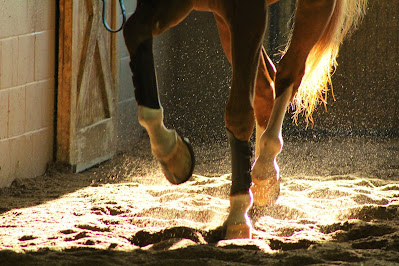
Wild West Sayings We Use Today, Part 32
Shindig
The Scottish are known for their keen appreciation of the value of a penny. They are extolled for their prowess and courage in battle. Crowds gather to watch muscled Scotsmen hurl logs the size of tree trunks in annual “games.” When it comes to throwing great parties, however, most folks don’t think of the Scots.Perhaps that’s short-sighted. ‘Shindig,’ a word as fun to say as the merrymaking spree it describes, most likely originated in Scotland.
Historical Reference: “‘Is this a dashed Puritan meeting? . . . ‘It’s no Pike County shindig’” (Atlantic Monthly, September 1871, page 373).
Some experts believe that shindig evolved from ‘shindy’ (a brawl; 1825). A later citation seems to confirm this: “You have noted that there are signs of a few bruises and scratches? ... Well, they are from the fight. It seems the people took us for Germans, and there was an awful palaver, which ended in a proper and handsome shindig.” (Stephen Crane’s Active Service of 1899)
Others think that 'shindig' derived from ‘shinty’ (shinny, shinney) a Scottish game akin to hockey that originated in the 1660s and is now obsolete. Sinteag, the Gaelic word for 'a bound or leap' is said to have produced 'shindig.'
Unless shindig refers to a playful kick in the leg, that is. An entry in Bartlett’s Dictionary of Americanisms supports this meaning for ‘shin-dig' which arose in the Southern states.
It’s not hard to imagine all these ideas distilling into a single, glorious word. Old Western movies presented a brawl as a form of amusement. At a rambunctious party, it's not hard to picture a clumsy dance partner delivering a kick.
Example: His graduation party is going to be a real shindig.
Skedaddle
Don’t you love words that roll trippingly off the tongue? The meaning of this one is not so fun, however. Skedaddle means ‘to run away in a panic.’Historical Reference: Skedaddle took off in popularity in 1861 as American Civil War slang. However, we probably have the Scottish to thank for this linguistic contribution. Although the exact origins are unknown, noted etymologist Anatoly Liberman states in An Analytic Dictionary of the English Etymology: An Introduction that ‘skedaddle’ “has no connection with any word of Greek, Irish, or Swedish, and it is not a blend.” Liberman believes that skedaddle may be related to the Scottish dialectical term skeindaddle (to spill). The inference is of spilling something while scurrying away in fear.
Liberman’s theory makes sense, but it is not assured. Wright’s English Dialect Dictionary of 1906 contains an entry for ‘skedaddle’ with no citations that predate American use of the term.
The earliest print record of skedaddle appears in “The Agitator” newspaper (Wellsboro, Pennsylvania; January 12, 1860). It makes its debut in the tale of a man who arrives in a town shortly after a steamboat explodes with great loss of life. Believing he was a survivor of the disaster, the townspeople look after him:
“Where did you find yourself after the ’splosion?”
“In a flat boat,” sez I.
“How far from the Frankling?” sez he.
“Why[”] sez I, “I never seed her, but as nigh as I can guess, about three hundred and seventy-five miles.”
“You’d oughter seen that gang skedaddle.”
Example: Say ‘get out of here,” in the most curmudgeonly way possible while shaking a cane, and you’ll nail it. (Yes, curmudgeonly is a word.)
Over to You
Thanks for reading another installment in our continuing study of Wild West Sayings We Use Today. Were you aware of these words and their meanings? Did either of them surprise you? Read my latest news, below.What's New with Janalyn Voigt
It's fun when the cover artist for your books is also a personal friend. My publisher, Mountain Brook Ink, hired Lynnette Bonner, a gifted cover artist and western romance writer, to create all the Montana Gold covers. Lynnette and I go way back as critique and retreat partners. It's always fun to work with her on a cover.
We haven't seen one another in a long while. Maybe that's true of you and your own friends. Lynnette and I decided that it was time for coffee together, and I'm glad we did. I didn't realize how desperately I needed to connect.
We haven't seen one another in a long while. Maybe that's true of you and your own friends. Lynnette and I decided that it was time for coffee together, and I'm glad we did. I didn't realize how desperately I needed to connect.
If you've kept up with these segments, you know that I've gone through a dark night of the soul. Lost creativity and physical injuries led to almost-missed deadlines. Living in semi-isolation apparently does not help me thrive. Now that I know that, getting out more is a priority. Am I afraid of the reigning virus? I'm more concerned about failing to live my life in vivid color.
Learn more about Janalyn Voigt and her books at her website.






Thanks for posting this morning. As always, I love these installments. I knew of both of these words. I think what surprised me was that there was an actual "shin-dig"; a physical aspect to the word. I have never heard it used that way. I'm glad that you are feeling a little more connected these days. I think we all need that.
ReplyDeleteHi, Connie. It's fun, isn't it, learning new things about old words? That surprised me about shindig, too. And, yes. We are not meant to isolate for long. Even a dyed-in-the-wool introvert (like me) eventually objects to the absence of others.
ReplyDeleteIt was so lovely to get together! <3 I'm an introvert too, but yes, isolation wears thin really fast. Let's not wait so long to do it again. <3
ReplyDeleteI enjoyed this post. We use each of the words you mentioned. I'm trying to force myself out among people, but I really prefer staying home.
ReplyDelete